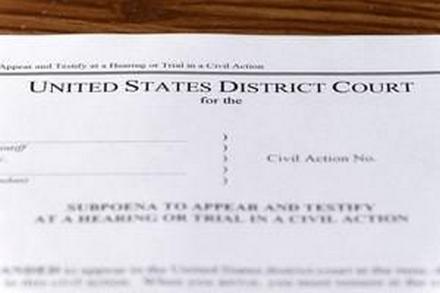TELEPHONES ANSWERED 24 HOURS A DAY
I Have Been Subpoenaed by a Grand Jury. What Should I Do?
 Federal criminal offenses are generally considered to be more severe than state-level offenses. The penalties for federal crimes are often severe, involving years or even decades in prison. If you have received a subpoena from a grand jury, you may understandably feel confused and panicked. You may be unsure of what this means and how you should respond.
Federal criminal offenses are generally considered to be more severe than state-level offenses. The penalties for federal crimes are often severe, involving years or even decades in prison. If you have received a subpoena from a grand jury, you may understandably feel confused and panicked. You may be unsure of what this means and how you should respond.
If you have received a grand jury subpoena, it means that the federal government believes that you have information related to a federal criminal case. It is very important to understand your rights and obligations in this situation. It is even more important to retain a skilled federal criminal defense lawyer who can advocate on your behalf and give you the personalized legal guidance you need.
Types of Grand Jury Subpoenas
Grand jury subpoenas are legal tools used by the government to gather evidence during the investigation or prosecution of a crime.
There are two main types of grand jury subpoenas:
-
Subpoena ad testificandum – This subpoena requires the individual to testify before the grand jury.
-
Subpoena duces tecum – A subpoena duces tecum subpoena requires the person to produce documents relevant to a case.
Grand juries are composed of 23 jurors. Jurors in a grand jury do not decide innocence or guilt of a defendant. Instead, prosecutors present evidence to a grand jury and the jurors deliberate about whether probable cause exists to believe an individual committed a crime.
If you received a grand jury subpoena, you may not know if you are the suspect of a crime or if the government wants you to provide information relevant to a case. Unfortunately, it can be hard to get information from the U.S. Attorney’s Office about the nature of the subpoena. An experienced federal criminal defense lawyer can communicate with the U.S. Attorney’s Office and gather more information.
Responding to the Subpoena
You may wonder if there is any way you can get out of the subpoena. Unfortunately, failure to comply with a grand jury subpoena can lead to contempt of court charges, so you cannot simply opt out of participating. However, your lawyer may be able to file challenges that limit the scope of the subpoena. Your lawyer can also help you prepare to provide the testimony or document the court is requiring.
Contact a Federal Crimes Defense Lawyer in Chicago
If you or a loved one received a grand jury subpoena, contact the Law Offices of Hal M. Garfinkel LLC right away. Chicago criminal defense attorney Hal M. Garfinkel is a former prosecutor with nearly two decades of legal experience. Call our office today at 312-629-0669 for a free initial consultation.
Source:
https://www.federalrulesofcriminalprocedure.org/title-iv/rule-17-subpoena/




